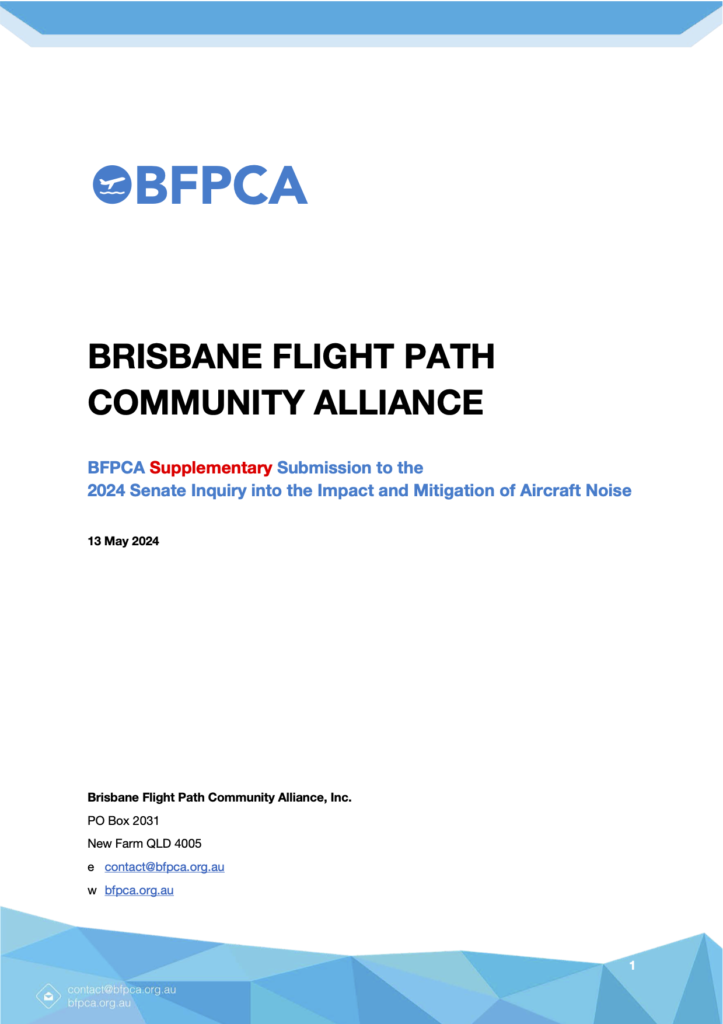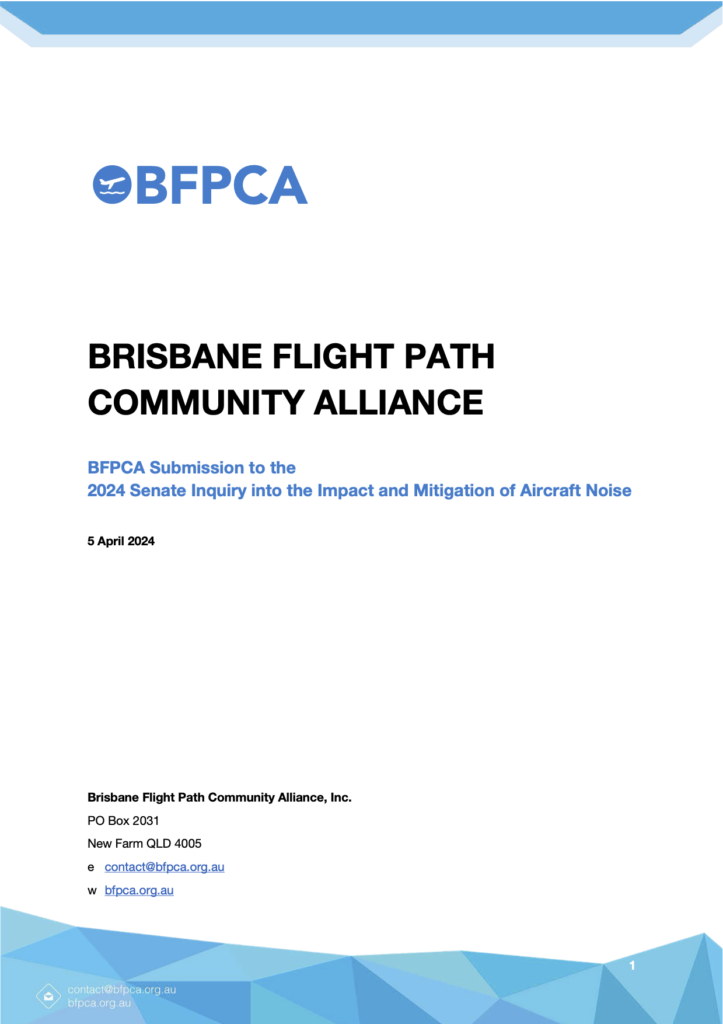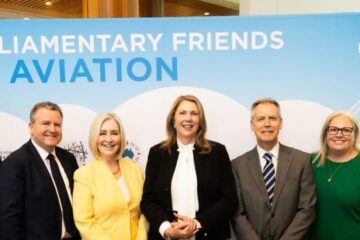- BFPCA’s Submissions to the Senate Inquiry
- Canberra Public Hearing: 20 Sep 2024
- Brisbane Public Hearing and BFPCA opening statement: 15 April 2024
- Make a submission by 30 April 2024
- BFPCA Media Release
BFPCA’s Submissions to the Senate Inquiry
13 May 2024: Supplementary Submission
In the Brisbane public hearing, we heard statements and responses from representatives of the aviation and tourism industry. In part A of this supplementary submission we fact check and rebut some of the key misleading statements that amount to deception and lies.
In part B, we call for government intervention to mandate comprehensive noise monitoring, research prioritisation on the health impacts of low frequency and infrasound, and adaptation of equipment and protocols by manufacturers, to ensure citizens’ health and socio-economic wellbeing are protected from the adverse effects of aircraft noise pollution.

5 April 2024: Original Submission
BFPCA is grateful for the opportunity to participate in this Senate Inquiry into the impact and mitigation of aircraft noise and the corrupt and unethical conduct of Airservices Australia. We ask that the inquiry’s recommendations allow for the following community allegations against Airservices Australia and the Australian Government to be investigated.
Our submission is structured in three parts, each relating to the Terms of Reference as follows:
- Part A: Evidence
- Part B: Objectives
- Part C: Appendices

Canberra Public Hearing: 20 Sep 2024
Brisbane Public Hearing: 15 April 2024
On Monday 15 April 2024, the first public hearing of the Senate Inquiry into aircraft noise was held in Brisbane in a room packed with community members. BFPCA gave evidence to the Senators about how aircraft noise pollution is not just a nuisance or inconvenience, it is a health issue, and it is causing real harm to families and communities in more than 220 suburbs across Greater Brisbane. Read the BFPCA opening statement here.
Excellent expert accounts were given by Prof. John Quiggin (UQ) (submission) and Distinguished Prof. Lidia Morawska (QUT) (slides) who provided rigorous assessments of the economics and the health harms.
Further testimony was given by the chairs of BACACG and the AAB – two advisory bodies set up by the government that are akin to engagement theatre. Their evidently lacklustre and disingenuous efforts to properly engage affected communities saw them reprimanded by the Senators, and they were told to re-do their homework in the form of supplementary submissions due early May.
It was very apparent that the Brisbane Airport Corporation representatives were extremely uncomfortable having to front up for the very first time the community whose lives they continue to destroy. Embarrassingly for BAC, they had to publicly admit that the end of the world is NOT nigh if a curfew and flight cap are introduced as with proper slot allocation they are still able to maintain flights to regional Queensland.
With more hearings likely to be scheduled soon around the country, we expect that Airservices Australia will be summoned to the Canberra hearing. BFPCA would like to thank all community members who attended the hearing and those who came forward in the open mic session at the end of the day to provide compelling and heart-felt evidence of their lived experiences. We also thank the Senators for asking tough questions of Brisbane Airport and industry representatives on behalf of the community.
BFPCA Opening Statement
Aircraft noise pollution is not just a nuisance or inconvenience, it is a health issue, and it is causing real harm to families and communities in more than 220 suburbs across Greater Brisbane.
With the launch of the New Parallel Runway on 12 July 2020 came a new airspace design and flight paths that concentrate aircraft noise over densely populated residential areas.
Brisbane Airport and Airservices Australia sold this project to us suggesting it will enable them to prioritise “over water” operations that direct planes away from residential areas. Prior to the launch, BAC’s CEO Gert-Jan de Graaff is on the record saying, “the net effect of aircraft flying over the city will decrease.”
His statement turned out to be false and misleading.
Today, we read in their submission to this inquiry: “BAC has limited influence in reducing aircraft noise.” (p. 1)
That is why BFPCA wants the Australian Government to enforce BAC to maintain their social licence to operate – by legislating a curfew, a flight cap, and a long-term operating plan.
BAC’s submission suggests the introduction of a curfew “would stifle regional economic growth,” “reduced access to medical care,” introduce “inconvenient domestic flight times,” and “increase cost of airfares.” None of this occurred in Sydney or any other airport internationally that introduced a curfew. – So why would this happen here?
BAC claims a curfew would cause, “an economic loss of over $2b annually in 2032.”
2019 figures show that Sydney Airport facilitated $7.6b of direct economic value to Australia in 2019. This was with a curfew and flight cap.
If Sydney Airport can do this with a curfew, why can’t Brisbane?
The estimates BAC presents to us cannot be trusted. They are produced by a PR company called “Queensland Economic Advocacy Solutions.” The emphasis here is on “Advocacy” as they present a biased view, which does not account for the property devaluations nor for the health costs associated with Brisbane Airport’s operations.
Today, we will hear from real experts, Dr Sean Foley, Prof. John Quiggin and Distinguished Prof. Lidia Morawska, who will offer a scientifically rigorous cost/benefit analysis, and I commend their findings to this committee.
BFPCA’s hope is that this Inquiry will shine a light on the state capture of Australia’s regulatory framework by the aviation industry, including unethical practices and misconduct by Airservices Australia.
Airservices have repeatedly breached public trust; they have abused their powers to remove “over water” operations without consultation or re-approval, and; they have failed to meet ministerial conditions imposed on them under the EPBC Act.
In the definition of Australia’s National Anti-Corruption Commission, this constitutes corrupt conduct.
BFPCA’s hope is that this Inquiry will end the state capture and prepare for the introduction of strong regulation in the aviation sector to protect ordinary Australians.
Thank you.
Make a submission by 30 April 2024
We have prepared a guide and template to assist you in making a submission to the Senate Inquiry we won on the impact and mitigation of aircraft noise. This is a guide only and you should make your submission in the way that best represents your personal experiences and thoughts on aircraft noise.
The most powerful thing you can do is to tell your story about how aircraft noise has impacted you and loved ones in your own words.
- Download our template, open it in Microsoft Word. The sections highlighted in yellow are there to prompt your thinking, but you do not need to follow these.
- Once you have considered the highlighted suggestions, amend the document with your own submission content.
- Make sure you delete the highlighted sections once you have finished using them for reference.
- Save your submission.
- Then visit the Inquiry’s web page to upload your Submission by 30 April 2024. Some people have reported technical issues with the upload. In this case, email your submission to: rrat.sen@aph.gov.au. Email a copy of your submission to: contact@bfpca.org.au.
- The secretariat will progressively review submissions and upload them here. We are advised that submissions may not be processed for a couple of weeks as it is a manual process. If you don’t see your submission there after a couple of weeks, please email the secretariat at: rrat.sen@aph.gov.au
How to write a powerful submission
Your submission should be succinct and lead with the most impactful information first. Don’t exaggerate, but be clear about the impacts to you. Don’t underrepresent the impacts, either. Be factual and honest. When writing your submission think about BFPCA’s 60 reasons to protest and our top ten list below as well as the following:
- Personal impacts of aircraft noise
- What impacts do you experience to your sleep, concentration, mental health, physical health, new and compounding existing stress, relationships, enjoyment of home?
- Do these impacts affect loved ones, such as your children at their home and/or school?
- Are you impacted in your workplace or small business? Do you know of small businesses that are impacted?
- How have your behaviours changed as a result of the noise? E.g. do you not visit your local park anymore because its impacted by noise; do you not visit a business you used to; your time taken up seeking improvements to noise; have you had to move?
- Misleading and sub-standard engagement
- Airservices Australia and Brisbane Airport Corporation ran limited community engagement, what was your experience (if any) with it prior to the runway opening?
- After the runway opening?
- More information is available here.
- Lack of regulatory controls of aircraft noise for community
- How regulations are needed to better control the unscrupulous behaviour of airports and Airservices Australia (which is funded by the airlines).
- The lack of justice and fairness in the whole process from planning through to implementation, as well as ongoing engagement from those responsible, including from elected representatives, governments, government departments, etc.
- How a legislated curfew and flight cap are needed to fix the problem in Brisbane.
As per the Senate’s own guidelines, the best submissions:
- clearly address some or all of the terms of reference—you do not need to address each one
- are relevant and highlight your own perspective
- are concise, generally no longer than four to five pages
- begin with a short introduction about yourself or the organisation you represent
- emphasise the key points so that they are clear
- outline not only what the issues are but how problems can be addressed, as the committee looks to submissions for ideas to make recommendations
- only include documents that directly relate to your key points
- only include information you would be happy to see published on the internet.
The Inquiry’s Terms of Reference
The impact and mitigation of aircraft noise on residents and business in capital cities and regional towns, with particular reference to:
- the effect of aircraft noise on amenity, physical and mental wellbeing and everyday life of residents;
- the effect of aircraft noise on small business;
- any proposals for the mitigation and limitation of aircraft noise, including flight curfews, changes to flight paths and alternatives to air travel;
- any barriers to the mitigation and limitation of aircraft noise; and
- any other related matters.
Brisbane Flight Path Community Alliance secures Senate Inquiry into aircraft noise pollution and alleged misconduct by Airservices Australia
Media Release, 6 Feb 2024
- Community pressure is working: BFPCA’s community advocacy has successfully secured a Senate Inquiry into both aircraft noise pollution and the practices of Airservices Australia.
- Ten allegations against Airservices: BFPCA is targeting ten key Airservices behaviours ranging from stonewalling of legitimate noise complaints and failure to meet ministerial conditions, to making Australian skies unsafe through worker shortages caused by their Air Traffic Controller Retirement Incentive Scheme.
- Community Objectives: BFPCA is calling for Brisbane flight paths to be redesigned and for the independence of the Aircraft Noise Ombudsman to be strengthened.
Community pressure led by a Brisbane community group fighting aircraft noise, Brisbane Flight Path Community Alliance, has culminated in an aircraft noise Senate Inquiry being instigated by the Australian Greens. Supported by the Coalition and cross bench, the Inquiry success follows an exhaustive political engagement and community advocacy campaign that has seen thousands of Brisbane residents take to the streets and contact their elected representatives.
The Inquiry specifically addresses the affects on amenity, physical and mental wellbeing, and everyday life of residents. It will also investigate the impact on small businesses while exploring proposals for noise mitigation and limitation, barriers to mitigation, and any other related matters. The proposal for the Senate Inquiry into the “impact and mitigation of aircraft noise on residents and business in capital cities and regional towns” was moved by Senator Janet Rice and passed in a vote on the voices. It will now be referred to the Rural and Regional Affairs and Transport References Committee for inquiry and report by 8 October 2024.
BPFCA has long called for parliamentary intervention into the aircraft noise crisis affecting 220+ suburbs across Greater Brisbane, highlighting a pattern of unethical practices and misconduct by Airservices Australia, the body responsible for air traffic control and flight path design.
While noise is the primary symptom experienced on a day-to-day basis, BFPCA says it is the unscrupulous and unethical practices of Airservices Australia and their regulatory capture by the aviation industry that is the main problem. This allows them to get away with repeated aircraft noise disasters across Australia.
As well as aircraft noise, BFPCA’s focus through the Inquiry will be on:
- Stonewalling complaints: Airservices’ systematic obstruction of legitimate complaints, with staff trained to deliberately downplay or ignore issues raised by community members.
- Mental health impact: More than 25,000 complaints since 2020 about Brisbane Airport have prompted Airservices to offer free mental health and suicide counselling to affected communities, highlighting the true toll of aircraft noise on communities and Queensland’s health system .
- Tax reduction redundancies leading to unsafe skies: The COVID-era Air Traffic Controller Retirement Incentive Scheme is under scrutiny, delivering enormous tax benefits to Airservices but leaving air-traffic control so shortstaffed flights are regularly canceled and airport operations limited to the most noise generating modes for communities.
- Technical incompetence: Airservices delivered such a poor airspace design for Brisbane that it needed to be externally reviewed by aviation consultancy TRAX International after community pressure highlighted failings.
- Ministerial conditions go unmet: Airservices Australia neglected ministerial EPBC conditions imposed on them, outsourcing their due diligence obligations to Brisbane Airport Corporation who stood to benefit most in an unethical conflict of interest.
- Bait-and-switch tactics: Changes in noise reduction procedures, such as the removal of SODPROPS (over water operations), were implemented without community consultation, undermining the initial promises made during the 2007 MDP/EIS approval process in potential breach of the EPBC Act.
- Misleading noise data: Airservices Australia endorses flawed noise forecast data and averages, artificially lowering noise figures and misleading communities about the actual impacts of flight paths at every airport in Australia.
- Faux noise improvement trials: Recent noise improvement trials run by Airservices in Brisbane were set up to fail from the outset, raising questions about the sincerity of their efforts to address community concerns.
- Capture by the aviation industry: Leaked documents reveal Airservices Australia’s alignment with aviation industry interests, jeopardising their commitment to impartial regulation and accountability to the communities they serve.
- Breach of the Air Services Act 1995: BFPCA alleges that Airservices Australia prioritises commercial gains over community wellbeing, violating their mandate under the Air Services Act 1995.
BFPCA says it will use this Senate Inquiry to push for far-reaching regulatory reform to correct the Brisbane crisis and prevent further crises from emerging in places like Western Sydney. The Inquiry will investigate the aviation industry’s undue influence and state capture of the regulator.
BFPCA continues to advocate for additional investigations by the National Anti-Corruption Commission and the Auditor-General, removal and investigation of Airservices’ CEO Jason Harfield and his executive managers, the separation of conflicting interests within Airservices, declaring Brisbane Airport a leviable airport, replacing the flawed ANEF noise forecast approach, and strengthening the independence of the Aircraft Noise Ombudsman.
Quotes attributable to Prof. Marcus Foth, BFPCA Chair
- “Today’s Senate Inquiry win is a testament to the resilience and determination of our community and is a resounding victory for residents of more than 220 Greater Brisbane suburbs impacted by aircraft noise pollution.”
- “It marks a turning point in our fight against the negative effects of aircraft noise pollution and the unscrupulous conduct of Airservices Australia.”
- “We’ve uncovered a disturbing pattern of unethical practices at Airservices, including conflicts of interest and misconduct, so we expect the Senate Inquiry to bring about accountability, reforms and real change for our communities.”
- “It’s clear Brisbane is not alone in this fight, and this is a win for all Australians facing similar challenges such as those in Western Sydney about to be hit by flight path noise from the new airport in Badgery’s Creek. We’ll continue to call on the government to prioritise the wellbeing of communities over commercial interests and to be transparent and accountable.”
- “We extend our thanks to the Australian Greens and Coalition Senators, as well as the cross-bench, who recognised the urgency of this issue in establishing the Inquiry. Our fight is far from over, but today’s victory gives us hope that we’re now on a path to justice and fairness on aircraft noise pollution.”
ENDS
Media contact: Professor Marcus Foth, BFPCA Chair, contact@bfpca.org.au
About BFPCA
With the launch of Brisbane Airport’s New Parallel Runway on 12 July 2020 came a new airspace design and flight paths that concentrate aircraft noise over densely populated residential areas.
Brisbane Airport and Airservices Australia sold this project to Brisbane communities suggesting the New Parallel Runway will enable them to prioritise “over water” operations that direct planes away from residential areas. The CEO Gert-Jan de Graaff is on the record saying, “the net effect of aircraft flying over the city will decrease.”
Brisbane families and communities are suffering from excessive noise pollution and associated health and related impacts from Brisbane Airport’s new flight paths launched in July 2020. The Aircraft Noise Ombudsman report, the Brisbane Airport PIR Advisory Forum (BAPAF) and flight path design consultants TRAX International have all confirmed that Brisbane communities were misled using flawed noise modelling, deceiving community engagement, and offered inadequate noise abatements.
Brisbane Flight Path Community Alliance (BFPCA) came together in 2020 to fight back on behalf of all Brisbane families and communities experiencing this noise pollution.
For more background information, visit: https://bfpca.org.au/


